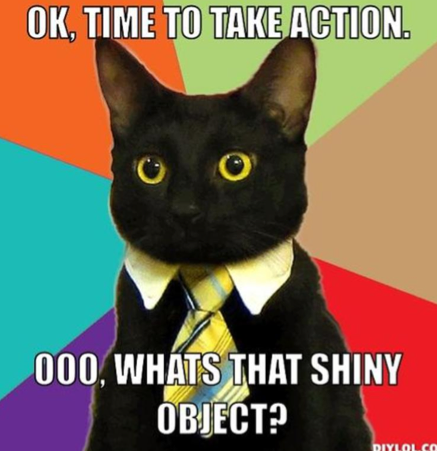THE SHINY OBJECT
There is an aspect of marketing that many despise - the nuts and bolts. These are the daily, weekly, monthly, and yearly tasks that actually make the marketing machine run.
They aren't sexy
And they might just drive you crazy
But the fact is, this is where the rubber meets the road and the dollars are made or lost. It's absolutely crucial that marketers be able to focus, have the tools they need to succeed, and that they and those above them AVOID THE SHINY OBJECT.
Many of us love to constantly be in the know, have access to the latest tools, be trying the newest tactic, or conquering the newest platform. While all of these things deserve some of your time and energy, the urge to continually be pushing into new things must be curbed, or true work will never occur, and dollars will be lost through waste, missed opportunity, and poor decision making.
Enter Discipline
Discipline can be a four letter word (wait a minute...). Too much discipline in marketing kills creativity, squelches enthusiasm, and can lead to demotived employees. However, not enough discipline can quickly lead to shiny-object syndrome. Learning to discipline ourselves, no matter where we sit in the business hierarchy is essential to success. Personally, I've found the following items to be extremely beneficial when working toward mastering the discipline of, well..err...discipline.
Make time for fun
Achieving discipline is about balance. Building in appropriate pockets of time for exploration, creative work, and play allows for focus to take place when that needs to happen. This applies to both day-to-day activities and long-term projects. Too many marketing efforts never get off the ground because they are abandoned too early. Think flywheel.
The flywheel is a crucial concept in digital marketing and shiny objects are major threats to achieving "flywheel" success. Allow time for exploration and fun, understand what that is for you and your team, but realize new discovery or opportunity needs to be appropriately vetted while continuing with your current focus.
Understand your personal pace and rhythm
Life, work, and so much of what we do each day is about rhythm. Please note, rhythm and routine are not nescessarily the same thing. Good rhythm allows you to move through daily activities with a positive attitude, relative ease, and an ability to adapt to the unknown while still keeping focused on an end goal. Routine on the other hand is about doing the same thing over and over again.
Mastering your rhythm will allow you to adjust to what you need at the moment, while allowing you to continue to stay motivated on your task at hand. It will also help you give yourself grace to step oustide your routine without feeling like you're breaking your discipline. Learn when you need to engage other parts of your brain, when you need to play, when you need to connect with your team over something else, and then flow back into work. Too far into discipline or too far into rhythm and you'll end up frustrated or easily distracted and unproductive. Balance is a key aspect of rhythm and discipline.
Build personal and team checkpoints
At work we've become very good at building out data checkpoints that are used to track progress, evaluate success, etc. as we move toward completing a project or keeping our marketing machines' humming. What we aren't as good at is keeping an eye on cultural and personal checkpoints that allow us to evaluate if we and our teams are in the right position, performing the right tasks, and functioning cohesively.
To achieve scale and efficiency in digital marketing (and really all marketing) which is crucial to maximizing investment, you must capitalize on what you've built in the past while understanding how to integrate new elements, processes, people, tools, ideas, buisness objectives, etc. In order to accomplish this, it's imparative that what you have built runs as smoothly as possible. I personally believe this requires continual focus on the soft aspects of the effort (people, energy, culture, etc.) as well as the hard aspects (data points, goals, deadlines, etc.). Appropriate checkpoints designed to re-evaluate the soft aspects will help spot trouble before people walk out the door or are distracted by shiny objects because they've lost interest, become demotivated, etc.
There is a reason manufacturing companies started cross-training employees who worked on assembly lines. It kept them focused, it kept them engaged, it kept them learning and growing. It kept the machine running well.
Develop an evaluation plan
When new tools, tasks, ideas, etc. come into view, it's important that they not be ignored, but that they not cause distraction either. Developing a process to effciently handle evaluation of these aspects of marketing and business is crucial to avoiding chasing shiny objects while not missing an opportunity. This is especially true for SMB's who often rely on first mover advantages to capitalize on shifts in consumer or target market preferences, technology, and other market impacters. Don't skimp here. Think creatively, make it fun, get the right people on it, but don't allow it to pull energy from where it's really needed in order to execute your strategy.
TL:DR
Shiny objects come in many forms ranging from tools, to new objectives and goals, to new tactics and processes. Learning to maintain discipline through self and team awareness, balance between work and work-play, and having appropriate plans for evaluating new opportunities will help keep teams and individuals focused for the long-haul so that you can achieve marketing effciency.




